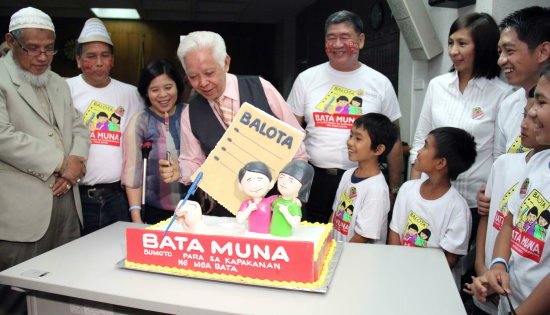Bata Muna marches
to COMELEC, dares next political leaders to improve status of Filipino
children

By
SAVE THE CHILDREN
March 7, 2013
MANILA – More than a
hundred children and child rights advocates from civil society
organizations and government agencies trooped to the Commission on
Elections (COMELEC) office in Intramuros, Manila today, March 7, and
challenged aspiring political leaders to improve the status of the
children in the country.
The campaign, “Bata Muna:
Bomoto Para sa Kapakanan ng Kabataan” launched with a birthday party
theme is forward looking as the group is hopeful to celebrate a new
batch of political leaders who will improve the status of children in
the country.
Initiated by Save the
Children together with Samahan ng Mamamayan - Zone One Tondo
Organization (ZOTO) and children’s organizations leading the Children
Talk to Talk (C2C) About the UN Convention on the Rights of Children
Project, “Bata Muna” campaign is now joined by 22 other organizations
around the country.
“We are expecting more
organizations and individuals to join us,” said Deborah Carmina
Sarmiento, Policy Advocacy Manager of Save the Children. “Bata Muna
now involves 25 organizations. These organizations are reaching and
directly serving over a million children across the country,” she
added.
According to Save the
Children, “Bata Muna” campaign wants political leaders who will stand
up for children’s rights, voters to demand for political
accountability on children’s rights, make children’s issues visible
during the campaign time and ultimately influence voters to consider
children when voting.
Among other children’s
rights issues, the campaign calls for a stricter implementation of the
law against child trafficking under the recently enacted Expanded
Anti-Trafficking in Persons Act of 2012. Figures from the Department
of Social Welfare and Development (DSWD) reveal that from January 2003
to September 2012, 23% of the trafficked victims in the Philippines
are children, of which 85% are girls.
Among the factors that
contribute to child trafficking in the Philippines are poverty, low
economic development in the communities of origin, lack of education
and skills for better economic options, limited employment
opportunities, inadequate awareness among families, and gender
inequalities.
“Until now, children still
fall into the traps of traffickers. The anti-trafficking law
notwithstanding, its impact on the children still relies on its strict
implementation,” said Marilen Soliman, Regional Coordinator of Asia
ACTs. Asia ACTs is a regional network of organizations working
together to protect all children in Southeast Asia from exploitation
and abuse.
Despite laws and policies
that are already in place, the National Statistical Coordination Board
(NSCB) states that children and women remain to be two of the poorest
basic sectors of Philippine society with a poverty incidence of 34.8%
and 25.1%, respectively.
Meanwhile, the Mindanao
Action Group for Children’s Rights and Protection (MAGCRP), a network
of child-rights advocates working in collaboration with the Provincial
Government of North Cotabato, calls on aspiring leaders to really look
into the situation of children around the country.
In Mindanao for example,
thousands of children are displaced because of armed conflict and
emergencies, most recently Typhoon Pablo, which severely hit poor
provinces of Davao Oriental and Compostela Valley. At least 40% of the
six million affected by Typhoon Pablo are children.
Also, children in rural
areas work in mining operations and commercial plantations while
children in urban areas fall victims to trafficking, sexual abuse and
prostitution. “Government’s social services hardly reach children
especially those who belong to Lumads and Moro families in far-flung
areas. Registration of children in these communities is still a
problem,” said Chris Peñales of FPOP-SOCCKSKSARGEN Chapter, lead
agency of MAGCRP.
“Tomorrow, March 8, the
Philippines along with the rest of the world is going to commemorate
International Women’s Day. This is also a time to take notice of
issues affecting young girls, such as sexual abuse, teenage pregnancy,
trafficking and prostitution. This is one aspect of the many
children’s issues that candidates can include in their agenda,” shared
Sarmiento.
“Beyond our campaign to put
forward children issues during the elections, the Bata Muna will
continue campaigning to hold those who will be elected accountable.
They must deliver programs and policies that will improve the
situation of children in the country. Enough of campaign promises that
remains to be just that – promises,” ended Sarmiento.